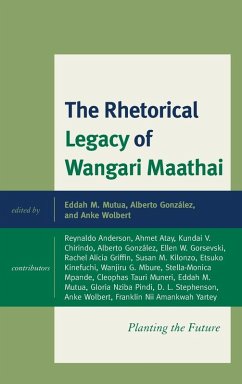The Rhetorical Legacy of Wangari Maathai
Planting the Future
Herausgeber: Mutua, Eddah Mbula; Wolbert, Anke; González, Alberto
The Rhetorical Legacy of Wangari Maathai
Planting the Future
Herausgeber: Mutua, Eddah Mbula; Wolbert, Anke; González, Alberto
- Gebundenes Buch
- Merkliste
- Auf die Merkliste
- Bewerten Bewerten
- Teilen
- Produkt teilen
- Produkterinnerung
- Produkterinnerung
This book explores and honors the rhetorical legacy of Dr. Wangari Maathai, winner of the 2004 Nobel Peace Prize. Each chapter provides an analysis of Maathai's public advocacy as she attempted to persuade the world to provide greater protection of earth's habitats.
Andere Kunden interessierten sich auch für
![Rhetorical Delivery and Digital Technologies Rhetorical Delivery and Digital Technologies]() Sean MoreyRhetorical Delivery and Digital Technologies228,99 €
Sean MoreyRhetorical Delivery and Digital Technologies228,99 €![The Rhetorical Invention of America's National Security State The Rhetorical Invention of America's National Security State]() Marouf HasianThe Rhetorical Invention of America's National Security State150,99 €
Marouf HasianThe Rhetorical Invention of America's National Security State150,99 €![PCOS Discourses, Symbolic Impacts, and Feminist Rhetorical Disruptions of Institutional Hegemonies PCOS Discourses, Symbolic Impacts, and Feminist Rhetorical Disruptions of Institutional Hegemonies]() Marissa C. McKinleyPCOS Discourses, Symbolic Impacts, and Feminist Rhetorical Disruptions of Institutional Hegemonies107,99 €
Marissa C. McKinleyPCOS Discourses, Symbolic Impacts, and Feminist Rhetorical Disruptions of Institutional Hegemonies107,99 €![Purpose, Practice, and Pedagogy in Rhetorical Criticism Purpose, Practice, and Pedagogy in Rhetorical Criticism]() Purpose, Practice, and Pedagogy in Rhetorical Criticism143,99 €
Purpose, Practice, and Pedagogy in Rhetorical Criticism143,99 €![Purpose, Practice, and Pedagogy in Rhetorical Criticism Purpose, Practice, and Pedagogy in Rhetorical Criticism]() Purpose, Practice, and Pedagogy in Rhetorical Criticism68,99 €
Purpose, Practice, and Pedagogy in Rhetorical Criticism68,99 €![The Rhetorical Power of Children's Literature The Rhetorical Power of Children's Literature]() The Rhetorical Power of Children's Literature56,99 €
The Rhetorical Power of Children's Literature56,99 €![The Rhetorical Uses of the Authorizing Figure The Rhetorical Uses of the Authorizing Figure]() Donald E. RiceThe Rhetorical Uses of the Authorizing Figure80,99 €
Donald E. RiceThe Rhetorical Uses of the Authorizing Figure80,99 €-
-
-
This book explores and honors the rhetorical legacy of Dr. Wangari Maathai, winner of the 2004 Nobel Peace Prize. Each chapter provides an analysis of Maathai's public advocacy as she attempted to persuade the world to provide greater protection of earth's habitats.
Hinweis: Dieser Artikel kann nur an eine deutsche Lieferadresse ausgeliefert werden.
Hinweis: Dieser Artikel kann nur an eine deutsche Lieferadresse ausgeliefert werden.
Produktdetails
- Produktdetails
- Verlag: Lexington Books
- Seitenzahl: 244
- Erscheinungstermin: 25. Oktober 2018
- Englisch
- Abmessung: 235mm x 157mm x 19mm
- Gewicht: 552g
- ISBN-13: 9781498571128
- ISBN-10: 1498571123
- Artikelnr.: 53211347
- Herstellerkennzeichnung
- Libri GmbH
- Europaallee 1
- 36244 Bad Hersfeld
- gpsr@libri.de
- Verlag: Lexington Books
- Seitenzahl: 244
- Erscheinungstermin: 25. Oktober 2018
- Englisch
- Abmessung: 235mm x 157mm x 19mm
- Gewicht: 552g
- ISBN-13: 9781498571128
- ISBN-10: 1498571123
- Artikelnr.: 53211347
- Herstellerkennzeichnung
- Libri GmbH
- Europaallee 1
- 36244 Bad Hersfeld
- gpsr@libri.de
Eddah M. Mutua is professor of intercultural communication at St. Cloud State University. Alberto González is distinguished university professor in the School of Media and Communication at Bowling Green State University. Anke Wolbert is lecturer in the School of Communication, Media, and Theatre Arts at Eastern Michigan University
Acknowledgements Introduction: Wangari Maathai and Social Justice Advocacy
Alberto González, Eddah M. Mutua, and Anke Wolbert Part I: Africa and the
Rhetoric of the Green Belt Movement Chapter One: Bantu Sociolinguistics in
Wangari Maathai's Peacebuilding Rhetoric Kundai V. Chirindo Chapter Two:
Envisioning Peace and Reconciliation for Kenya: Wangari Maathai's 2008
Peace Tent Opening Ceremony Address Anke Wolbert Chapter Three: The
Rhetorical Potency of Storytelling: The Narrative Role of the Hummingbird
in the Green Belt Movement Franklin Nii Amankwah Yartey Chapter Four:
Heroic Transverser: A Rhetorical Analysis of Representations of Wangari
Maathai Wanjiru G. Mbure Chapter Five: Wangari Maathai's Rhetorical Vision:
Empowerment through Education Ahmet Atay Chapter Six: The Green Belt
Movement and Rhetoric of African Development Communication Stella-Monica
Mpande and Cleophas Tauri Muneri Part II: Planting the Future: Sustaining
Agency in and beyond the Green Belt Movement Chapter Seven: The Rhetorical
Significance of Maathai's Environmental Advocacy to Critical Intercultural
Communication and Black Feminisms Rachel Alicia Griffin and Gloria Nziba
Pindi Chapter Eight: Wangari Maathai and Mottainai: Gifting "Cultural
Appropriation" with Cultural Empowerment Etsuko Kinefuchi Chapter Nine:
Daughter of the Soil: Wangari Maathai's Rhetorical Vision of Environmental
Justice and Reform Reynaldo Anderson and D.L. Stephenson Chapter Ten:
Growing the Next Generation: The Sustainability of Wangari Maathai's
Rhetoric of Environmentalism Ellen W. Gorsevski Chapter Eleven: Planting
the Future: The Spiritual Legacy of Wangari Maathai Eddah M. Mutua and
Susan M. Kilonzo References Index About the Editors About the Contributors
Alberto González, Eddah M. Mutua, and Anke Wolbert Part I: Africa and the
Rhetoric of the Green Belt Movement Chapter One: Bantu Sociolinguistics in
Wangari Maathai's Peacebuilding Rhetoric Kundai V. Chirindo Chapter Two:
Envisioning Peace and Reconciliation for Kenya: Wangari Maathai's 2008
Peace Tent Opening Ceremony Address Anke Wolbert Chapter Three: The
Rhetorical Potency of Storytelling: The Narrative Role of the Hummingbird
in the Green Belt Movement Franklin Nii Amankwah Yartey Chapter Four:
Heroic Transverser: A Rhetorical Analysis of Representations of Wangari
Maathai Wanjiru G. Mbure Chapter Five: Wangari Maathai's Rhetorical Vision:
Empowerment through Education Ahmet Atay Chapter Six: The Green Belt
Movement and Rhetoric of African Development Communication Stella-Monica
Mpande and Cleophas Tauri Muneri Part II: Planting the Future: Sustaining
Agency in and beyond the Green Belt Movement Chapter Seven: The Rhetorical
Significance of Maathai's Environmental Advocacy to Critical Intercultural
Communication and Black Feminisms Rachel Alicia Griffin and Gloria Nziba
Pindi Chapter Eight: Wangari Maathai and Mottainai: Gifting "Cultural
Appropriation" with Cultural Empowerment Etsuko Kinefuchi Chapter Nine:
Daughter of the Soil: Wangari Maathai's Rhetorical Vision of Environmental
Justice and Reform Reynaldo Anderson and D.L. Stephenson Chapter Ten:
Growing the Next Generation: The Sustainability of Wangari Maathai's
Rhetoric of Environmentalism Ellen W. Gorsevski Chapter Eleven: Planting
the Future: The Spiritual Legacy of Wangari Maathai Eddah M. Mutua and
Susan M. Kilonzo References Index About the Editors About the Contributors
Acknowledgements Introduction: Wangari Maathai and Social Justice Advocacy
Alberto González, Eddah M. Mutua, and Anke Wolbert Part I: Africa and the
Rhetoric of the Green Belt Movement Chapter One: Bantu Sociolinguistics in
Wangari Maathai's Peacebuilding Rhetoric Kundai V. Chirindo Chapter Two:
Envisioning Peace and Reconciliation for Kenya: Wangari Maathai's 2008
Peace Tent Opening Ceremony Address Anke Wolbert Chapter Three: The
Rhetorical Potency of Storytelling: The Narrative Role of the Hummingbird
in the Green Belt Movement Franklin Nii Amankwah Yartey Chapter Four:
Heroic Transverser: A Rhetorical Analysis of Representations of Wangari
Maathai Wanjiru G. Mbure Chapter Five: Wangari Maathai's Rhetorical Vision:
Empowerment through Education Ahmet Atay Chapter Six: The Green Belt
Movement and Rhetoric of African Development Communication Stella-Monica
Mpande and Cleophas Tauri Muneri Part II: Planting the Future: Sustaining
Agency in and beyond the Green Belt Movement Chapter Seven: The Rhetorical
Significance of Maathai's Environmental Advocacy to Critical Intercultural
Communication and Black Feminisms Rachel Alicia Griffin and Gloria Nziba
Pindi Chapter Eight: Wangari Maathai and Mottainai: Gifting "Cultural
Appropriation" with Cultural Empowerment Etsuko Kinefuchi Chapter Nine:
Daughter of the Soil: Wangari Maathai's Rhetorical Vision of Environmental
Justice and Reform Reynaldo Anderson and D.L. Stephenson Chapter Ten:
Growing the Next Generation: The Sustainability of Wangari Maathai's
Rhetoric of Environmentalism Ellen W. Gorsevski Chapter Eleven: Planting
the Future: The Spiritual Legacy of Wangari Maathai Eddah M. Mutua and
Susan M. Kilonzo References Index About the Editors About the Contributors
Alberto González, Eddah M. Mutua, and Anke Wolbert Part I: Africa and the
Rhetoric of the Green Belt Movement Chapter One: Bantu Sociolinguistics in
Wangari Maathai's Peacebuilding Rhetoric Kundai V. Chirindo Chapter Two:
Envisioning Peace and Reconciliation for Kenya: Wangari Maathai's 2008
Peace Tent Opening Ceremony Address Anke Wolbert Chapter Three: The
Rhetorical Potency of Storytelling: The Narrative Role of the Hummingbird
in the Green Belt Movement Franklin Nii Amankwah Yartey Chapter Four:
Heroic Transverser: A Rhetorical Analysis of Representations of Wangari
Maathai Wanjiru G. Mbure Chapter Five: Wangari Maathai's Rhetorical Vision:
Empowerment through Education Ahmet Atay Chapter Six: The Green Belt
Movement and Rhetoric of African Development Communication Stella-Monica
Mpande and Cleophas Tauri Muneri Part II: Planting the Future: Sustaining
Agency in and beyond the Green Belt Movement Chapter Seven: The Rhetorical
Significance of Maathai's Environmental Advocacy to Critical Intercultural
Communication and Black Feminisms Rachel Alicia Griffin and Gloria Nziba
Pindi Chapter Eight: Wangari Maathai and Mottainai: Gifting "Cultural
Appropriation" with Cultural Empowerment Etsuko Kinefuchi Chapter Nine:
Daughter of the Soil: Wangari Maathai's Rhetorical Vision of Environmental
Justice and Reform Reynaldo Anderson and D.L. Stephenson Chapter Ten:
Growing the Next Generation: The Sustainability of Wangari Maathai's
Rhetoric of Environmentalism Ellen W. Gorsevski Chapter Eleven: Planting
the Future: The Spiritual Legacy of Wangari Maathai Eddah M. Mutua and
Susan M. Kilonzo References Index About the Editors About the Contributors








